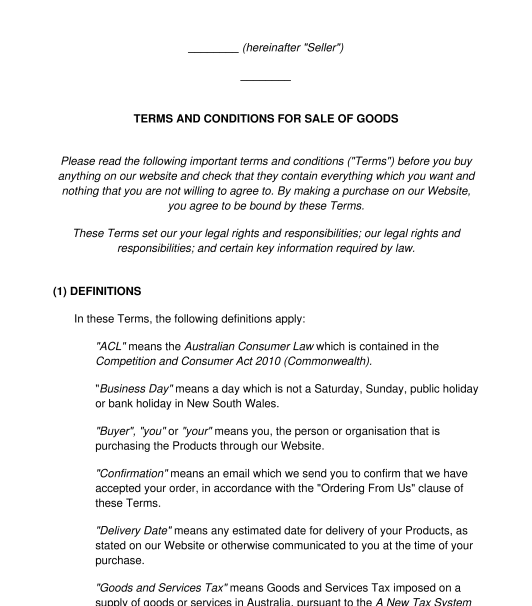 26/01/2025
26/01/2025

Answer a few questions and your document is created automatically.

Your document is ready! You will receive it in Word and PDF formats. You will be able to modify it.

 26/01/2025
26/01/2025
 Word and PDF
Word and PDF
 9 to 14 pages
9 to 14 pages
Terms and Conditions for Sale of Goods Online, also commonly known as Online Sales Terms, constitute an agreement that the seller and buyer enter when goods are sold online. These terms and conditions lay out the rules, obligations, and expectations of both parties during the online sale of goods. They include details such as price, delivery information, risk of loss, and the return policy, providing a fair and equitable framework for the relationship between seller and buyer.
These Terms and Conditions can govern the sale of any type of goods online, whether it's a one-time sale or multiple transactions over a period of time. However, they are not intended for use in real estate transactions or any other services that are not goods.
The digital nature of online transactions necessitates a comprehensive written agreement to prevent any misunderstandings and to protect both parties in the event of any dispute. These terms and conditions provide a clear understanding of what is expected from both the seller and buyer during the transaction.
While these terms may look similar to a Sale of Goods Agreement or Website Terms and Conditions, they serve a distinct purpose. The Sale of Goods Agreement is typically used for in-person sales and is signed by both parties before the transaction. On the other hand, the Terms and Conditions for Sale of Goods Online are agreed upon by the buyer electronically, often by checking a box on the website at the time of purchase.
In contrast, the Website Terms and Conditions govern the overall use of a website, not just the sale of goods, and often include details about copyright, intellectual property rights, acceptable use, and disclaimers.
The Australian Government provides guidance on consumer contracts, covering topics like consumer guarantees and unfair contract terms, on its Australian Consumer Law website.
This document is used by a seller setting up an online shop or by a buyer looking to understand their rights and obligations when purchasing goods online. In this document, parties can identify essential details such as whether the parties are individuals or businesses, and their respective contact information. The document also allows the parties to enter important characteristics of the agreement, such as a description of the goods, pricing, delivery information, transfer of ownership, warranties, and risk of loss.
Once the document is prepared, it should be uploaded to the seller's website, typically linked from the footer or the checkout page. Buyers should be required to agree to these terms before making a purchase.
Importantly, if the Australian Consumer Law applies and the seller is providing any warranties against defects in relation to the goods, the law requires these warranties to be presented in a certain way and include specific information. There are penalties for failure to do this. If in doubt, seek legal advice.
Sellers should keep an updated version of these Terms and Conditions on their website and may consider periodically reminding buyers to review the terms.
Terms and Conditions for Sale of Goods Online in Australia are subject to general principles of contract law.
If goods are being sold to the public, then the Australian Consumer Law, which is set out in the Competition and Consumer Act 2010 (Commonwealth), may apply.
In addition, the Privacy Act 1988 (Commonwealth) may also apply to these Terms and Conditions, given that personal information is often collected during online transactions.
Each state and territory of Australia has a version of a Sale of Goods Act, which may also apply. Furthermore, the Electronic Transactions Act 1999 (Commonwealth) may apply to ensure the validity and enforceability of online transactions.
If in doubt, seek legal advice.
You fill out a form. The document is created before your eyes as you respond to the questions.
At the end, you receive it in Word and PDF formats. You can modify it and reuse it.
A guide to help you: What to do after Preparing a Contract
Country: Australia